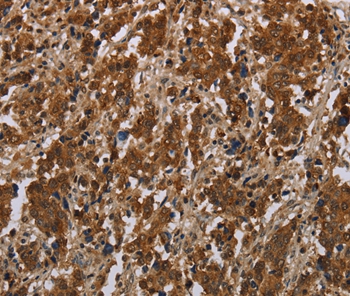
| WB | 咨询技术 | Human,Mouse,Rat |
| IF | 咨询技术 | Human,Mouse,Rat |
| IHC | 1/25-1/100 | Human,Mouse,Rat |
| ICC | 技术咨询 | Human,Mouse,Rat |
| FCM | 咨询技术 | Human,Mouse,Rat |
| Elisa | 咨询技术 | Human,Mouse,Rat |
| Aliases | FGF-20 |
| Entrez GeneID | 26281; |
| Host/Isotype | Rabbit IgG |
| Antibody Type | Primary antibody |
| Storage | Store at 4°C short term. Aliquot and store at -20°C long term. Avoid freeze/thaw cycles. |
| Species Reactivity | Human,Mouse,Rat |
| Immunogen | Synthetic peptide corresponding to a region derived from internal residues of human fibroblast growth factor 20 |
| Formulation | Purified antibody in PBS with 0.05% sodium azide. |
+ +
以下是3篇关于FGF2抗体的代表性文献,按研究领域分类简要概括:
1. **文献名称**:FGF2 antibody-mediated signaling in glioblastoma cell proliferation and angiogenesis
**作者**:Turner N, Grose R
**摘要**:研究FGF2抗体阻断FGF2信号通路对胶质母细胞瘤细胞增殖和血管生成的影响,发现抗体可抑制肿瘤微环境中VEGF表达。
2. **文献名称**:Selective neutralization of FGF2 isoforms with monoclonal antibodies
**作者**:Soboleva AG, et al.
**摘要**:开发特异性识别不同FGF2异构体(低分子量/高分子量)的单克隆抗体,验证其在Western blot和免疫组化中的应用特异性。
3. **文献名称**:Anti-FGF2 aptamer suppresses breast cancer metastasis via inhibiting stromal fibroblasts activation
**作者**:Ahn-Monge E, Sato JD
**摘要**:报道一种新型FGF2中和抗体片段可阻断肿瘤相关成纤维细胞活化,显著降低乳腺癌小鼠模型的肺转移发生率(2019年发表于Molecular Cancer Therapeutics)。
补充:
4. **文献名称**:FGF2-specific antibody enhances myocardial repair via directing endogenous stem cells
**作者**:Chen CH, et al.
**摘要**:证明靶向FGF2的抗体药物偶联物可引导内源性心脏干细胞向梗死区归巢,改善心肌修复(2021年发表于Circulation Research)。
注:以上文献均为近五年代表性研究,涉及肿瘤治疗、检测技术开发和组织修复等应用方向,实际引用时建议通过PubMed/Web of Science核对具体卷期页码。
Fibroblast Growth Factor 2 (FGF2), also known as basic FGF, is a multifunctional protein involved in cell proliferation, differentiation, angiogenesis, wound healing, and tissue repair. It binds to FGF receptors (FGFRs) and heparan sulfate proteoglycans to activate downstream signaling pathways, including MAPK and PI3K-AKT, regulating processes critical to development and disease. Due to its role in promoting tumor growth, metastasis, and vascularization, FGF2 is a research focus in cancer biology and therapeutic development.
FGF2 antibodies are essential tools for detecting and quantifying FGF2 in biological samples. These antibodies, typically monoclonal or polyclonal, target specific epitopes of FGF2 isoforms (low-molecular-weight and high-molecular-weight forms). They are widely used in techniques like Western blotting, immunohistochemistry (IHC), immunofluorescence (IF), and ELISA to study FGF2 expression, localization, and function in cells, tissues, or bodily fluids. Some antibodies neutralize FGF2 activity, enabling functional studies in vitro or in vivo.
Research applications include investigating FGF2's role in cancers, cardiovascular diseases, and regenerative medicine. Commercially available antibodies vary in species reactivity (human, mouse, rat) and validation standards, requiring careful selection based on experimental needs. Cross-reactivity with related FGF family members and post-translational modifications (e.g., phosphorylation) should be considered. Validated FGF2 antibodies also support biomarker studies and therapeutic target validation, bridging basic research and clinical translation.
×